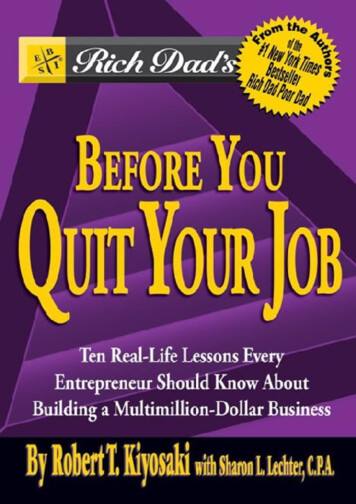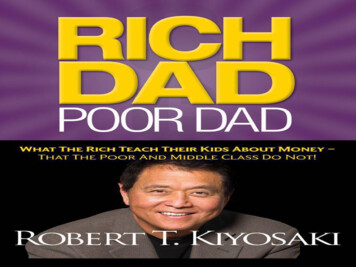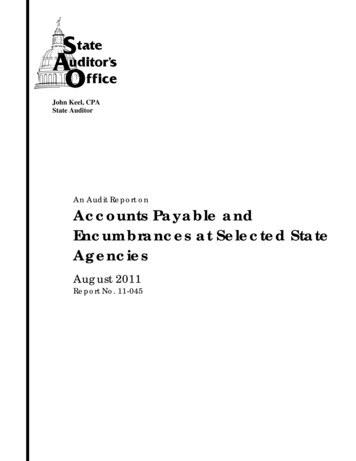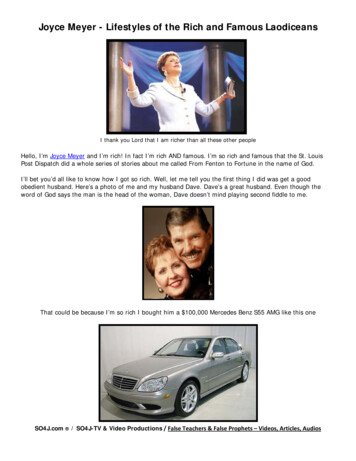
Transcription
Copyright 2005 by Robert T. Kiyosaki with Sharon L. Lechter.All rights reserved.Hachette Book Group237 Park AvenueNew York, NY 10017Visit our website at www.HachetteBookGroup.com.The Warner Books name and logo are trademarks of Hachette Book Group,Inc.ISBN: 978-0-7595-1453-9First eBook Edition: September 2005OceanofPDF.com
ContentsCopyrightAcknowledgmentsIntroductionRich Dad’s Entrepreneurial Lesson #1: A Successful Business Is CreatedBefore There Is a Business.Chapter 1: What Is the Difference Between an Employee and anEntrepreneur?Rich Dad’s Entrepreneurial Lesson #2: Learn How to Turn Bad LuckInto Good Luck.Chapter 2: Dumb and Dumber Gets Rich and RicherRich Dad’s Entrepreneurial Lesson #3: Know the Difference BetweenYour Job and Your Work.Chapter 3: Why Work for Free?Rich Dad’s Entrepreneurial Lesson #4: Success Reveals Your Failures.Chapter 4: Street Smarts versus School SmartsRich Dad’s Entrepreneurial Lesson #5: The Process Is More Importantthan the Goal.
Chapter 5: Money TalksRich Dad’s Entrepreneurial Lesson #6: The Best Answers Are Found inYour Heart . . . Not Your Head.Chapter 6: The Three Kinds of MoneyRich Dad’s Entrepreneurial Lesson # 7: The Scope of the MissionDetermines the Product.Chapter 7: How to Go from Small Business to Big BusinessRich Dad’s Entrepreneurial Lesson #8: Design a Business That Can DoSomething That No Other Business Can Do.Chapter 8: What Is the Job of a Business Leader?Rich Dad’sEntreprenuerial Lesson #9: Don’t Fight for the BargainBasement.Chapter 9: How to Find Good CustomersRich Dad’s Entrepreneurial Lesson # 10: Know When to Quit.Chapter 10: The SummaryOceanofPDF.com
Other Bestselling Books byRobert T. Kiyosaki & Sharon L. LechterRich Dad Poor DadWhat the Rich Teach Their Kids About Moneythat the Poor and Middle Class Do NotRich Dad’s CASHFLOW QuadrantRich Dad’s Guide to Financial FreedomRich Dad’s Guide to InvestingWhat the Rich Invest In that the Poor and Middle Class Do NotRich Dad’s Rich Kid Smart KidGive Your Child a Financial Head StartRich Dad’s Retire Young Retire RichHow to Get Rich Quickly and Stay Rich ForeverRich Dad’s ProphecyWhy the Biggest Stock Market Crash in History is Still Coming.And How You Can Prepare Yourself and Profit from it!Rich Dad’s Success StoriesReal-Life Success Stories from Real-Life PeopleWho Followed the Rich Dad LessonsRich Dad’s Guide to Becoming Rich Without Cutting Up Your Credit CardsTurn “Bad Debt” into “Good Debt”Rich Dad’s Who Took My Money?Why Slow Investors Lose and Fast Money Wins!Rich Dad Poor Dad for TeensThe Secrets About Money—That You Don’t Learn In School!Rich Dad’s Escape from the Rat RaceHow to Become a Rich Kid by Following Rich Dad’s AdviceBefore You Quit Your Job10 Real-Life Lessons Every Entrepreneur Should KnowAbout Building a Multimillion-Dollar Business
AcknowledgmentsEntrepreneurship is as much a spirit as it is a vocation. When Rich Dadpartnered with Warner Books it was in large part due to Laurence Kirshbaum,Warner’s CEO and Chairman. We recognized that entrepreneurial spark in hiseyes. He energized his “Can Do” attitude throughout the entire organization.While publishing may not be a cutting-edge industry, Larry Kirshbaum is acutting-edge leader and has been a joy to work with. Thank you, Larry.Robert KiyosakiSharon LechterOceanofPDF.com
IntroductionWhat Makes Entrepreneurs Different?One of the most frightening days of my life was the day I quit my job andofficially became an entrepreneur. On that day I knew there were no moresteady paychecks, no more health insurance or retirement plan. No more daysoff for being sick or paid vacations.On that day, my income went to zero. The terror of not having a steadypaycheck was one of the most frightening experiences I had ever experienced.Worst of all, I did not know how long it would be before I would have anothersteady paycheck . . . it might be years. The moment I quit my job I knew thereal reason why many employees do not become entrepreneurs. It is fear ofnot having any money . . . no guaranteed income . . . no steady paycheck.Very few people can operate for long periods of time without money.Entrepreneurs are different, and one of those differences is the ability tooperate sanely and intelligently without money.On that same day, my expenses went up. As an entrepreneur, I had to rentan office, a parking stall, a warehouse, buy a desk, a lamp, rent a phone, payfor travel, hotels, taxis, meals, copies, pens, paper, staples, stationery, legaltablets, postage, brochures, products, and even coffee for the office. I also hadto hire a secretary, an accountant, an attorney, a bookkeeper, a businessinsurance agent, and even a janitorial service. These were all expenses myemployer had once paid for me. I began to realize how expensive it had beento hire me as an employee. I realized that employees cost far more than thenumber of dollars reflected in their paychecks.So another difference between employees and entrepreneurs is thatentrepreneurs need to know how to spend money, even if they have no money.
The Start of a New LifeThe day I officially left the company, I was in San Juan, Puerto Rico. It wasJune 1978. I was in Puerto Rico because I was attending the XeroxCorporation’s President’s Club celebration, an event recognizing the topachievers in the company. People had come from all over the world to berecognized.It was a great event, a gala I will always remember. I could not believehow much money Xerox was spending just to recognize the top salespeople inthe company. But even though it was a celebration, I was having a miserabletime. Throughout the three-day event, all I could think about was leaving thejob, the steady paycheck, and the security of the company. I realized that oncethe party in San Juan was over, I was going to go on my own. I was not goingback to work at the Honolulu Branch Office or the Xerox Corporation.When leaving San Juan, the plane I was on experienced some kind ofemergency. In preparing to land at Miami, the pilot had us all brace, cradleour heads, and prepare for a possible crash. I was already feeling bad enoughabout this being my first day as an entrepreneur, but now I had to prepare todie on top of it? My first day as an entrepreneur was not off to a very goodstart.Obviously, the plane did not crash, and I flew on to Chicago where I wasgoing to do a sales presentation for my line of nylon surfer wallets. I arrivedat the Chicago Mercantile Mart late because of the flight delays, and the clientI was supposed to meet, a buyer from a large chain of department stores, wasalready gone. Once again I thought to myself, “This is not a good way to startmy new career as an entrepreneur. If I don’t make this sale there will be noincome for the business, no paycheck for me, no food on the table.” Since Ilike to eat, having no food disturbed me the most.Are Some People Born Entrepreneurs?“Are people born entrepreneurs or are they trained to be entrepreneurs?”When I asked my rich dad his opinion on this age-old question, he said,“Asking if people are born or trained to be entrepreneurs is a question thatmakes no sense. It would be like asking if people are born employees ortrained to become employees?” He went on to say, “People are trainable.They can be trained to be either employees or entrepreneurs. The reason thereare more employees than entrepreneurs is simply that our schools train youngpeople to become employees. That is why so many parents say to their child,
‘Go to school so you can get a good job.’ I have yet to hear any parent say,‘Go to school to become an entrepreneur.’”Employees Are a New PhenomenonThe employee is a rather new phenomenon. During the agrarian age, mostpeople were entrepreneurs. Many were farmers who worked the king’s lands.They did not receive a paycheck from the king. In fact, it was the other wayaround. The farmer paid the king a tax for the right to use the land. Thosewho were not farmers were tradespeople, aka small business entrepreneurs.They were butchers, bakers, and candlestick makers. Their last names oftenreflected their business. That is why today many people are named Smith, forthe village blacksmith; Baker, for bakery owners; and Farmer, because theirfamily’s business was farming. They were entrepreneurs, not employees.Most children who were raised in entrepreneurial families followed in theirparents’ footsteps, also becoming entrepreneurs. Again, it is just a matter oftraining.It was during the Industrial Age that the demand for employees grew. Inresponse, the government took over the task of mass education and adoptedthe Prussian system, upon which most Western school systems in the worldare today modeled. When you research the philosophy behind Prussianeducation, you will find that the stated purpose was to produce soldiers andemployees . . . people who would follow orders and do as they were told. ThePrussian system of education is a great system for mass-producing employees.It is a matter of training.The Most Famous EntrepreneursYou may also have noticed that many of our most famous entrepreneurs didnot finish school. Some of those entrepreneurs are Thomas Edison, founder ofGeneral Electric; Henry Ford, founder of Ford Motor Company; Bill Gates,founder of Microsoft; Richard Branson, founder of Virgin; Michael Dell,founder of Dell Computers; Steven Jobs, founder of Apple Computers andPixar; and Ted Turner, founder of CNN. Obviously, there are otherentrepreneurs who did well in school . . . but few are as famous as these.
The Transition from Employee to EntrepreneurI know I was not born a natural entrepreneur. I had to be trained. My rich dadguided me through a process of starting as an employee to eventuallybecoming an entrepreneur. For me, it was not an easy process. There was a lotI had to unlearn before I could begin to understand the lessons he was tryingto teach me.It was difficult hearing what my rich dad had to say because what he saidwas exactly opposite from the lessons my poor dad was trying to teach me.Every time my rich dad talked about entrepreneurship, he was talking aboutfreedom. Every time my poor dad talked to me about going to school to get ajob, he was talking about security. There was the clash of these twophilosophies going on in my head and it was confusing me.Finally I asked rich dad about the difference in philosophies. I asked,“Aren’t security and freedom the same thing?”Smiling, he replied, “Security and freedom are not the same . . . in factthey are opposites. The more security you seek, the less freedom you have.The people with the most security are in jail. That is why it is calledmaximum security.” He went on to say, “If you want freedom you need to letgo of security. Employees desire security and entrepreneurs seek freedom.”So the question is, can anyone become an entrepreneur? My answer is,“Yes. It begins with a change in philosophy. It begins with a desire for morefreedom than security.”From Caterpillar to ButterflyWe all know that a caterpillar spins a cocoon and one day emerges asbutterfly. It is a change so profound, it is known as a metamorphosis. One ofthe definitions of metamorphosis is a striking alteration in character. Thisbook is about a similar metamorphosis. This book is about the changes aperson goes through, when transitioning from employee to entrepreneur.While many people dream of quitting their job and starting their ownbusiness, only a few actually do it. Why? Because the transition fromemployee to entrepreneur is more than changing jobs . . . it is a truemetamorphosis.Entrepreneur Books Written by Nonentrepreneurs
Over the years, I have read many books about entrepreneurs and on thesubject of entrepreneurship. I studied the lives of such entrepreneurs asThomas Edison, Bill Gates, Richard Branson, and Henry Ford. I also readbooks on different entrepreneurial philosophies and what makes someentrepreneurs better than others. In every book, good or bad, I found somepriceless bit of information or wisdom that has helped me in my quest tobecome a better entrepreneur.Looking back at the books I have read, I noticed that they fall into twobasic categories: books written by entrepreneurs and books written bynonentrepreneurs. Most of the books are written by nonentrepreneurs, peoplewho are professional authors, journalists, or college professors.While I have gotten something important from every book, regardless ofwho wrote it, I did find something missing. What I found missing was the“down in the gutter,” “kick in the gut,” “stabbed in the back,” terrifyingmistakes and horror stories that almost every entrepreneur goes through. Mostof the books paint a picture of the entrepreneur as a brilliant, suave, coolbusinessperson who handled every challenge with ease. The books aboutgreat entrepreneurs often make it sound like they were born entrepreneurs,and granted, many of them were. Just as there are natural and gifted athletes,there are natural and gifted entrepreneurs, and most books are written aboutsuch people.Books on entrepreneurship written by college professors have a differentflavor. College professors tend to boil the subject to the bone, leaving only thestatic facts or findings. I find reading such technically correct books difficultbecause the reading is often boring. There is no meat left, nothing juicy, justthe bones.
How This Book Is DifferentThis is a book about entrepreneurship, written by entrepreneurs who haveexperienced the ups and downs, the successes and failures, of the real world.Today The Rich Dad Company is an international business with productsin forty-four different languages, doing business in over eighty countries. Butit all started as a company that my wife, Kim, and I started with our partnerSharon Lechter. It began on Sharon’s dining room table in 1997. Our initialinvestment was 1,500. Our first book, Rich Dad Poor Dad, has been on theNew York Times Best Seller List for over four and a half years, anaccomplishment shared by only three other books. Maybe, as you read thisbook, it will still be on the list.Rather than tell you how smart I am at business, which I am not, wethought it better to write a different type of book on entrepreneurship. Ratherthan tell you how I brilliantly sailed over the tallest peaks, and made millions,we thought you might learn more from how I dug many deep holes, fell intothem, and then had to dig my way out. Rather than tell you about all mysuccesses, we believe you will learn more from my failures.Why Write about Failures?Many people do not become entrepreneurs because they are afraid of failing.By writing about the things many people are afraid of, we hope to help youbetter decide if becoming an entrepreneur is for you. Our intent is not tofrighten you off—our intent is to provide a little “real world” insight on theups and downs of the process of becoming an entrepreneur.Another reason for writing about failures is that humans are designed tolearn by making mistakes. We learn to walk by first falling down and thentrying again. We learn to ride a bicycle by falling off and then trying again. Ifwe had never risked falling, we would go through life crawling likecaterpillars. One of the missing elements we have found in reading many ofthe books about entrepreneurship, especially those written by collegeprofessors, is that they do not go into the emotional trials and tribulations anentrepreneur goes through. They do not discuss what happens toentrepreneurs emotionally when the business fails, when they run out ofmoney, have to let employees go, and when their investors and creditors come
after them. How would most college professors know how a failingentrepreneur feels? How would they know—since a steady paycheck, tenure,always knowing the right answers, and never making mistakes are highlyprized in the academic world. Again, it’s all a matter of training.In the late 1980s, I was invited to do a talk on entrepreneurship atColumbia University. Rather than talk about my successes, I talked about myfailures and how much I learned from my mistakes. The young audienceasked a lot of questions and seemed genuinely interested in the ups and downsof becoming an entrepreneur. I talked about the fears we all face whenstarting a business, and how I faced those fears. I shared with them some ofthe more stupid mistakes I made and how those mistakes later becamevaluable lessons I would never have learned if I had not made the mistakes. Italked about the pain of having to shut a business down and lay people offbecause of my incompetence. I also shared with them how all my mistakeseventually made me a better entrepreneur, very rich, and most important,financially free, never needing a job again. All in all, I thought it was anobjective and realistic talk on the process of becoming an entrepreneur.A few weeks later, I found out that the faculty member who had invitedme to speak at the university was called into her department head’s office andreprimanded. His final words to her were, “We do not allow failures to speakat Columbia.”What Is an Entrepreneur?Now that we have torn into college professors, it is time to give them somecredit. One of the better definitions of an entrepreneur is from Howard H.Stevenson, a professor at Harvard University. He says, “Entrepreneurship isan approach to management that we define as follows: the pursuit ofopportunity without regard to resources currently controlled.” In my opinion,this is one of the most brilliant definitions of what an entrepreneur is. It isbare bones . . . and brilliant.The Power of ExcusesMany people want to become entrepreneurs but always have some excuse forwhy they do not quit their job, excuses such as:
1.2.3.4.5.6.7.8.“I don’t have the money.”“I can’t quit my job because I have kids to support.”“I don’t have any contacts.”“I’m not smart enough.”“I don’t have the time. I’m too busy.”“I can’t find anyone who wants to help me.”“It takes too long to build a business.”“I’m afraid. Building a business is too risky forme.”9. “I don’t like dealing with employees.”10. “I’m too old.”The friend who gave me this article by Professor Stevenson said, “Any twoyear-old is an expert at making excuses.” He also said, “The reason mostpeople who want to become entrepreneurs remain employees is that they havesome excuse that keeps them from quitting their job and taking that leap offaith. For many people, the power of their excuse is more powerful than theirdreams.”Entrepreneurs Are DifferentMr. Stevenson had many other bare bone gems in his article, especially whenhe compares entrepreneurs to employees or promoters to trustees, as he labelsthem. A few of these gems of comparison are:1. When it comes to their Strategic Orientation:PROMOTER: driven by perception of opportunity.TRUSTEE: driven by control of resources.In other words, entrepreneurs are always looking for the opportunitywithout much regard to whether they have resources. Employee type personsfocus on what resources they have or do not have, which is why so manypeople say, “How can I start my business? I don’t have the money.” Anentrepreneur would say, “Tie up the deal and then we’ll find the money.” This
difference in philosophies is a very big difference between employee andentrepreneur.This is also why my poor dad often said, “I can’t afford it.” Being anemployee he looked at his resources. Those of you who have read my otherbooks know that my rich dad forbade his son and me to ever say, “I can’tafford it.” Instead he taught us to look at opportunities and ask, “How can Iafford it?” He was an entrepreneur.2. When it comes to Management Structure:PROMOTER: Flat with multiple informal networks.TRUSTEE: Formalized hierarchy with multiple tiers.In other words, an entrepreneur will keep the organization small and lean,using cooperative relationships with strategic partners to grow the business.Employees want to build a hierarchy, which means a chain of command, withthem at the top. This is their concept of building an empire. An entrepreneurwill grow the organization horizontally, which means “outsourcing” ratherthan bringing the work “in house.” An employee wants to grow theorganization vertically, which means hiring more employees. Formalorganizational charts are very important to employees climbing the corporateladder.In this book, you will find out how The Rich Dad Company stayed smallyet grew big by using strong strategic partnerships with large hierarchies suchas Time Warner, Time Life, Infinity Broadcasting, and major publishersthroughout the world. We decided to grow in this manner because it cost usless time, people, and money. We could grow faster, grow bigger, becomevery profitable, have a global presence, and yet remain small. We used otherpeople’s money and resources to grow the business. This book will explainhow and why we did it that way.3. When it comes to Reward Philosophy:PROMOTER: Value driven, performance-based, team-oriented.TRUSTEE: Security driven, resource-based, job promotion-oriented.In simple terms, employees want job security with a strong company, asteady paycheck, and the opportunity for promotion—a chance to climb thecorporate ladder. Many employees consider a promotion and title moreimportant than money. I know my poor dad did. He loved his title,Superintendent of Public Education, even though he was not paid much.
The entrepreneur doesn’t want to climb the corporate ladder; he or shewants to own the corporate ladder. An entrepreneur is not driven by apaycheck but by results of the team. Also, as Howard Stevenson states, manyentrepreneurs start a business because they have very strong values, valuesthat are more important than simply job security and a steady paycheck. Thisbook will go into values far more important than money. For manyentrepreneurs, their values are more important than money. They arepassionate about their work, their mission, and love what they do. Manyentrepreneurs will do their work even though there is no money. Rich dadsaid, “Many employees are passionate about their work only as long as thereis a paycheck.”In this book, you will also learn about the three different types of money;competitive money, cooperative money, and spiritual money. Competitivemoney is the type of money most people work for. They compete for jobs,promotions, pay raises, and against their business competition. Cooperativemoney is achieved by networking instead of competing. In this book you willalso find out how The Rich Dad Company expanded rapidly with very littlemoney, simply by working for cooperative money. Also, a significant part ofthis book is dedicated to the mission of a business, the values. While we allknow that there are many entrepreneurs who are opportunists, working onlyfor competitive money, there are others who build a business on a strongmission, working for spiritual money—the best of all money.Different Styles of ManagementThere are two other points in the article that are refreshing, especially from acollege professor. Howard Stevenson acknowledges that many people say thatentrepreneurs are not good managers. Instead of agreeing with this commonlyaccepted point of view, he writes, “The entrepreneur is stereotyped asegocentric and idiosyncratic and thus unable to manage. However, althoughthe managerial task is substantially different for the entrepreneur, themanagement skill is nonetheless essential.” Right-on, Howard. In otherwords, entrepreneurs manage people differently. The next point explains whythere are differences in management style between entrepreneur andemployee.Know How to Use Other People’s Resources
The other point Stevenson makes tracks closely his definition of anentrepreneur, which is, “Entrepreneurship is an approach to management thatwe define as follows: the pursuit of opportunity without regard to resourcescurrently controlled.” He states, “Entrepreneurs learn to use other people’sresources well.” This is what causes the difference in management style.Employees want to hire people so they can manage them. It puts them indirect control over them. They will do as they are told or they are fired. Thisis why employee types want to build vertical hierarchies. They want thePrussian style of management. They want people to jump when they say,“Jump.”Since entrepreneurs are not necessarily managing employees, they need tomanage people differently. Very simply put, entrepreneurs need to know howto manage other entrepreneurs. If you say, “Jump,” to an entrepreneur, he orshe usually responds with some rude comment or gesture. So entrepreneursare not poor managers, as many people think; they simply have a verydifferent management style because they are managing people they cannot tellwhat to do . . . or fire.This difference in management style also explains why employee typeswork for competitive money and entrepreneurs tend to work for cooperativemoney.Employee Looking for EmployeesSome of the more common complaints heard from new entrepreneurs are, “Ican’t find good employees.” Or, “Employees just don’t want to work.” Or,“All employees want is more money.” This is a problem for a newentrepreneur with a confused management style. Management style is amatter of training. Again, compliments to Howard Stevenson, a collegeprofessor, for getting to the bare bones differences between entrepreneur andemployee.How to Order the ArticleThere is much more information packed into Howard H. Stevenson’sarticle entitled, “A Perspective on Entrepreneurship,” written in 1983.A copy of the article is available from Harvard Business School for
less than 10.00. To order go to http:/harvardbusinessonline.org. It is abrilliant article, and useful for anyone who is interested in the subjectof entrepreneurship.Don’t Wait till All Lights Are GreenAnother reason many people are not as successful as they would like to be isfear—often the fear of making mistakes or the fear of failing. There is anotherreason, also a fear, but it appears a little differently. These people disguisetheir fears by being perfectionists. They are waiting for all the stars to line upbefore starting their business. They want all the lights to be green before theywill pull out of the driveway. When it comes to entrepreneurship, many ofthese people are still stuck in the driveway with their engine idling.Three Parts of a BusinessOne of the best entrepreneurs I have ever known is a friend and businesspartner of mine. I have formed several companies with him—three that wentpublic and have made us multimillions. In describing what an entrepreneurdoes, he said, “There are three parts to putting a business deal together. One isfinding the right people. Two is finding the right opportunity. And three isfinding the money.” He also said, “Rarely do all three pieces come together atthe same time. Sometimes you have the people, but you do not have the dealor the money. Sometimes you have the money, but no deal or people.” He alsosaid, “The most important job of an entrepreneur is to grab one piece and thenbegin to put the other two pieces together. That may take a week or it maytake years, but if you have one piece, at least you’ve gotten started.” In otherwords, an entrepreneur does not care if two out of three lights are red. In fact,an entrepreneur does not care if all three lights are red. Red lights do notprevent an entrepreneur from being an entrepreneur.Anything Worth Doing Is Worth Doing PoorlyHave you ever noticed that software, such as Microsoft’s Windows, comes inversions such as Windows 2.0 and Windows 3.0? What that means is that theyhave improved their product and now want you to buy the better version. In
other words, the first product they sold you was not perfect. They may havesold it knowing it had flaws, bugs, and needed to be improved.Many people fail to get to market because they are constantly perfectingtheir product. Like the person who is waiting for all the lights to be green,some entrepreneurs never get to market because they are looking for, orworking on, perfecting their product or writing the perfect business plan. Myrich dad often said, “Anything worth doing is worth doing poorly.” HenryFord said, “Thank God for my customers. They buy my products before theyare perfected.” In other words, entrepreneurs start and continue to improvethemselves, their businesses, and their products. Many people will not startunless everything is perfect. That is why many of them never start.Knowing when to introduce a product into the marketplace is as much anart as a science. You may not want to wait for a product to be perfect; it maynever be perfect. It just has to be “good enough.” It merely has to work wellenough to be accepted in the marketplace. However, if the product is soflawed that it doesn’t work for its intended purpose, or otherwise does notmeet marketplace expectations or causes problems, it can be very difficult toreestablish credibility and a reputation for quality.One of the marks of a successful entrepreneur is being able to assess theexpectations of the marketplace and know when to stop developing and startmarketing. If the product is put on the market a little prematurely, then theentrepreneur can simply improve it, and take steps to maintain the goodwill inthe marketplace. On the other hand, delay in introducing a product can meanopportunities irretrievably lost, a window of opportunity missed.For those of you who remember the early versions of Windows, you’llrecall how frequently your computer “crashed.” (There were some who saidthat Windows was so full of bugs that it should have come with a can ofinsecticide.) If an automobile broke down as frequently as Windows did, itwould not have been acceptable in the marketplace. In fact, the automobilewould have been a “lemon,” and the manufacturer would have been forced toreplace it. Windows, however, notwithstanding the bugs—the flaws—wasphenomenally successful. Why was that?
Rich Dad Poor Dad What the Rich Teach Their Kids About Money that the Poor and Middle Class Do Not Rich Dad’s CASHFLOW Quadrant Rich Dad’s Guide to Financial Freedom Rich Dad’s Guide to Investing What the Rich Invest In that the Poor and Middle Class Do Not Rich Dad’s Rich Kid Smart Kid Give Your C










